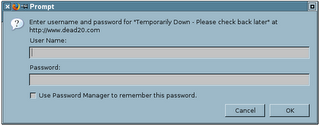But, hey, it's 2006. And surely I'm not the only person to have gotten married in, let us say, advanced middle age. I still use my maiden name for business and go by my husband's name for everything else. Especially when traveling with the kids--using different surnames on airplane tickets tends to make the Homeland Security guys very unhappy. And it's been a bit unhinging to have those little intimate talks in the side room with armed, unhappy people each time we travel together. (Happy vacation, kids! Pay no attention to that large man with the pistol!)
One day I notice that the last few places I worked for in my very long DP career had one thing in common even though they were totally different "industries". That thing was that as a central function of the system they had to keep very careful track of people as individuals. Now any business is likely to have lists of customers and potential customers and sending one person two copies of the same bill, or two ads is undesirable. No, I'm talking life or death here, medical records, tourist visas things like that. What surprised me was that there was no correlation between the importance of accurate identification and the care which went into solving the problem correctly.
People in some countries have very long names, and that has nothing to do with marriage, hyphenations, etc. Why is that last-name field 16 characters instead of 61 characters? I guarantee there is so much overhead in these databases these days that the extra space (especially if a variable length field) would make no difference from a storage point of view, and most databases actually perform BETTER with large numbers of distinct values than with many dupes. While the programmers and DBAs who don't have a clue are partly to blame, I think that MOST of the blame should go to the management of these organizations who don't even know how to ensure that fundamental business-rule objectives are being met.
Of course the fact that in some organization the concept of firing someone for incompetence is unknown doesn't help matters.
Yes it CAN be a problem when individuals are not consistent about how they identify themselves, but a lot of that problem goes back to restrictive rules about what a person's ID CAN actually be. We need to allow for long names, middle names (vs initials) and even multiple part names of more than 3. If you can design a system with check-boxes for "Mr", "Mrs", "Jr" and so on that's fine and dandy, but you have to allow for variations that you might not have thought of too and you have to have software that can cope with some of these inconsistencies, unless you want to hire rooms full of people to apply "artificial intelligence" to the problem. Based on the type of people they usually hire to do this, I suspect any computer solution will be better on average. That is *IF* they put enough space in the fields to capture all of the information.

